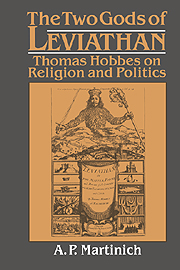Book contents
- Frontmatter
- Contents
- Acknowledgments
- A note on references
- Dedication
- INTRODUCTION
- PART I THE RELIGIOUS BACKGROUND TO HOBBES'S PHILOSOPHY
- Chapter 1 CONSIDERATIONS UPON THE REPUTATION AND RELIGION OF MR. HOBBES
- Chapter 2 RELIGION
- PART II LAW, MORALITY, AND GOD
- PART III RELIGION WITHIN THE LIMITS OF SCIENCE AND POLITICS
- Conclusion
- Appendix A Curley on Hobbes
- Appendix B Skinner on Hobbes
- Appendix C The frontispiece to Leviathan
- Notes
- Bibliography
- Index
Chapter 2 - RELIGION
Published online by Cambridge University Press: 30 December 2009
- Frontmatter
- Contents
- Acknowledgments
- A note on references
- Dedication
- INTRODUCTION
- PART I THE RELIGIOUS BACKGROUND TO HOBBES'S PHILOSOPHY
- Chapter 1 CONSIDERATIONS UPON THE REPUTATION AND RELIGION OF MR. HOBBES
- Chapter 2 RELIGION
- PART II LAW, MORALITY, AND GOD
- PART III RELIGION WITHIN THE LIMITS OF SCIENCE AND POLITICS
- Conclusion
- Appendix A Curley on Hobbes
- Appendix B Skinner on Hobbes
- Appendix C The frontispiece to Leviathan
- Notes
- Bibliography
- Index
Summary
In this chapter I want to discuss religion rather generally. I shall first discuss the importance of the idea of God in seventeenth-century philosophy. Next I shall consider, in a preliminary way, the role that theological concepts play in the introduction to Leviathan and in the book's title. The last section of the chapter is about Hobbes's treatment of the concept of religion.
GOD IN SEVENTEENTH-CENTURY PHILOSOPHY
It was more difficult for a person to be an atheist in the seventeenth century than it is for someone today, simply because there are so many atheists now. It was even more difficult to be a theoretical atheist – that is, a thinker who could given an explanation for reality that did not include God as an essential part. For there were virtually no atheistic models of reality from which a philosopher might draw inspiration to construct his own. I am not denying the possibility of a seventeenth-century atheistic philosopher. I am saying that it is unlikely and that the burden of proof is on those who say that Hobbes was an atheist.
Many historians have shown how pervasive religion was in all areas of intellectual and practical life during the seventeenth century (e.g., Popkin, 1987b; Hill, 1986, vol. 2). It is not within the scope of this book to rehearse the evidence for that view in any detail. Rather, I shall mention some of the most superficial and obvious facts about seventeenthcentury philosophy, in order to jog the reader's memory, singling out the philosophies of Descartes, Spinoza, Locke, and Leibniz.
- Type
- Chapter
- Information
- The Two Gods of LeviathanThomas Hobbes on Religion and Politics, pp. 40 - 68Publisher: Cambridge University PressPrint publication year: 1992



